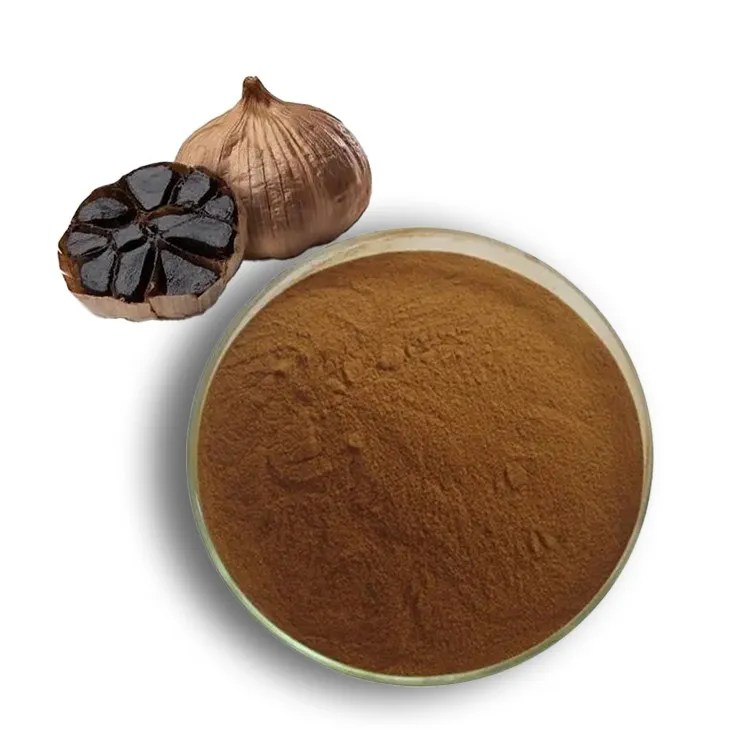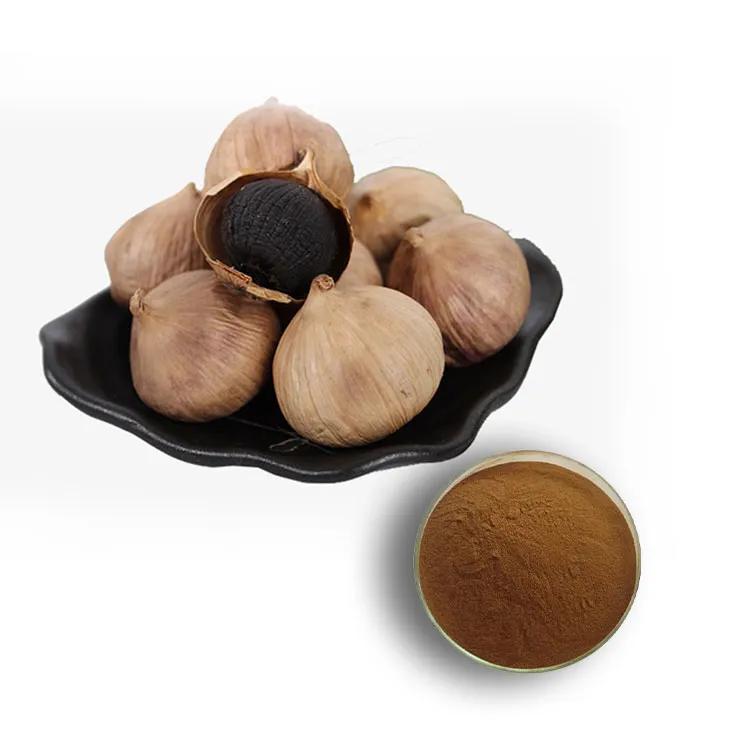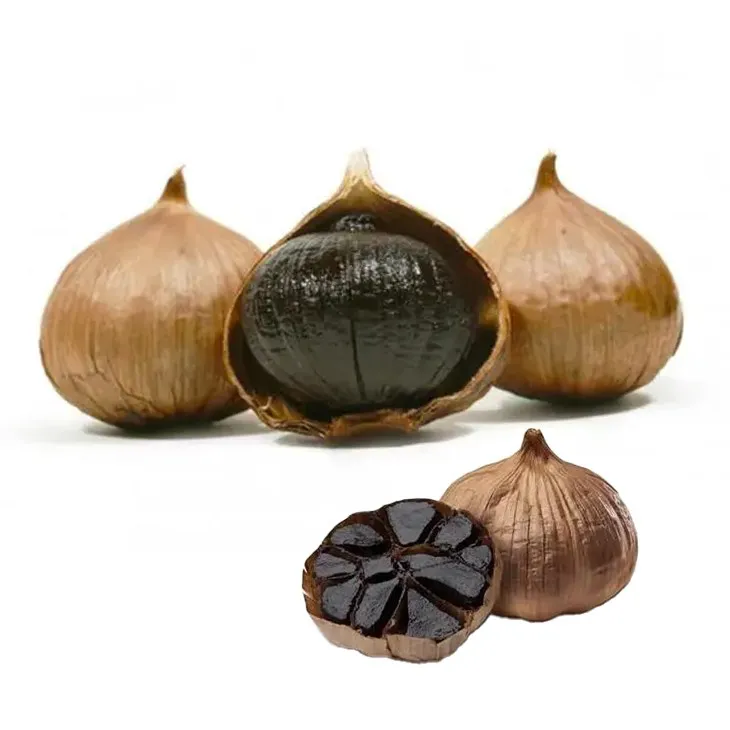- 0086-571-85302990
- sales@greenskybio.com
Is black garlic extract beneficial for diabetes? Are these all safe and suitable for diabetic patients?
2024-11-12

1. Introduction
Diabetes has become a global health concern, with a growing number of people seeking effective ways to manage their blood sugar levels. In recent years, Black Garlic Extract has emerged as a potential natural remedy. Black garlic is made by fermenting regular garlic, which changes its chemical composition and gives it a unique set of properties. This article aims to explore whether Black Garlic Extract is beneficial for diabetes and if it is safe and suitable for diabetic patients.

2. Black Garlic Extract and Blood Sugar Regulation
2.1. Mechanisms of Action
- Black garlic extract may influence blood sugar levels through multiple mechanisms. One possible way is by enhancing insulin sensitivity. Insulin is a hormone that helps cells take up glucose from the bloodstream. In diabetic patients, especially those with type 2 diabetes, insulin resistance is a common problem. Studies have suggested that certain compounds in black garlic extract can improve the body's response to insulin, allowing cells to more effectively utilize glucose. For example, allicin, a well - known compound in garlic (and also present in black garlic), has been shown to have positive effects on insulin - mediated glucose uptake in cell studies.
- Another mechanism could be related to its impact on carbohydrate digestion. Black garlic extract may slow down the breakdown of carbohydrates in the digestive tract. This means that glucose is released more slowly into the bloodstream, preventing rapid spikes in blood sugar levels. Compounds in black garlic might inhibit the activity of certain enzymes involved in carbohydrate digestion, such as alpha - amylase.
2.2. Research Evidence
- Several animal studies have provided evidence of the potential blood - sugar - regulating effects of black garlic extract. In diabetic rats, for instance, supplementation with black garlic extract led to a significant reduction in fasting blood glucose levels over a period of weeks. These rats also showed improvements in other metabolic parameters related to diabetes, such as reduced levels of glycated hemoglobin (HbA1c), which is an indicator of long - term blood sugar control.
- However, human studies on this topic are still relatively limited. Some small - scale clinical trials have reported promising results. In a study involving a group of pre - diabetic individuals, those who consumed black garlic extract daily for a few months showed a trend towards better blood sugar regulation compared to the control group. But more large - scale, long - term human studies are needed to confirm these initial findings and establish the optimal dosage and duration of black garlic extract supplementation for diabetes management.

3. Antioxidant Properties of Black Garlic Extract
3.1. Importance of Antioxidants in Diabetes
- Diabetes is associated with increased oxidative stress in the body. High blood sugar levels can lead to the production of free radicals, which are unstable molecules that can damage cells, proteins, and DNA. Oxidative stress plays a role in the development and progression of diabetic complications, such as neuropathy (nerve damage), retinopathy (eye damage), and nephropathy (kidney damage).
- Antioxidants are substances that can neutralize free radicals, reducing oxidative stress. By doing so, they may help prevent or slow down the development of these complications in diabetic patients.
3.2. Antioxidant Compounds in Black Garlic
- Black garlic contains a rich array of antioxidant compounds. S - allyl cysteine (SAC) is one of the main antioxidant components in black garlic. SAC has been shown to have strong antioxidant activity, scavenging free radicals and protecting cells from oxidative damage. In vitro studies have demonstrated that SAC can protect cells such as pancreatic beta - cells (which are important for insulin production) from oxidative stress - induced damage.
- Flavonoids are also present in black garlic. These compounds contribute to its antioxidant properties by donating electrons to free radicals, thereby neutralizing them. The antioxidant effects of black garlic extract may be cumulative, as different antioxidant compounds work together to combat oxidative stress.

4. Safety of Black Garlic Extract for Diabetic Patients
4.1. General Safety Considerations
- Black garlic extract is generally considered safe for most people when consumed in moderation. However, as with any supplement, there are some potential side effects. Some individuals may experience mild gastrointestinal discomfort, such as bloating, gas, or stomach upset, after consuming black garlic extract. This is usually due to its sulfur - containing compounds, which can be irritating to the digestive system in some cases.
- It is important to note that black garlic extract may interact with certain medications. For diabetic patients taking medications such as blood - thinning drugs or drugs to lower blood sugar, it is crucial to consult a healthcare provider before starting black garlic extract supplementation. For example, allicin in black garlic may have a mild blood - thinning effect, which could potentially increase the risk of bleeding when combined with anticoagulant medications.
4.2. Allergic Reactions
- Although relatively rare, allergic reactions to black garlic can occur. People who are allergic to regular garlic are more likely to be allergic to black garlic as well. Allergic symptoms may include skin rashes, itching, swelling, or in severe cases, difficulty breathing. If any signs of an allergic reaction are noticed after consuming black garlic extract, it should be discontinued immediately and medical attention sought.
5. Suitability for Different Types of Diabetic Patients
5.1. Type 1 Diabetes
- For type 1 diabetic patients, who have an autoimmune destruction of pancreatic beta - cells and require insulin injections for survival, black garlic extract may still offer some benefits. While it cannot replace insulin therapy, it could potentially help with blood sugar control by improving insulin sensitivity and reducing oxidative stress. However, since type 1 diabetes is a more complex and serious condition, any use of black garlic extract should be closely monitored by a healthcare provider in conjunction with regular insulin treatment.
5.2. Type 2 Diabetes
- Type 2 diabetes is often associated with lifestyle factors such as obesity and inactivity. Black garlic extract may be more directly applicable to type 2 diabetic patients. Its potential to enhance insulin sensitivity and regulate blood sugar levels makes it a promising natural supplement. In addition, the antioxidant properties of black garlic can also be beneficial in preventing or managing the complications associated with type 2 diabetes. However, lifestyle modifications such as diet and exercise remain the cornerstone of type 2 diabetes management, and black garlic extract should be seen as a complementary approach rather than a sole treatment.
6. How to Incorporate Black Garlic Extract into a Diabetic Diet
6.1. Dietary Sources
- Black garlic can be consumed directly as a food. It has a soft, chewy texture and a sweet - sour flavor. It can be added to various dishes, such as salads, stir - fries, or soups. Some people also like to spread black garlic paste on whole - grain bread or crackers.
- Black garlic extract is also available in supplement form, such as capsules or tablets. When choosing a supplement, it is important to select a high - quality product from a reputable manufacturer. Look for products that are standardized to contain a certain amount of active ingredients, such as S - allyl cysteine.
6.2. Dosage Recommendations
- Currently, there is no established standard dosage of black garlic extract for diabetes management. However, based on some of the available studies, a daily dosage of 1 - 3 grams of black garlic extract (equivalent to about 3 - 9 grams of black garlic) may be a reasonable starting point. But again, it is essential to consult a healthcare provider before starting any supplementation, especially for diabetic patients who are already taking medications or have other health conditions.
7. Conclusion
Black garlic extract shows potential benefits for diabetes in terms of blood sugar regulation and antioxidant properties. It may be a safe and suitable option for some diabetic patients, especially when used in moderation and under the guidance of a healthcare provider. However, more research is needed to fully understand its long - term effects, optimal dosage, and potential interactions with medications. Diabetic patients should not rely solely on black garlic extract for diabetes management but can consider it as a part of a comprehensive approach that includes diet, exercise, and appropriate medical treatment.
FAQ:
1. What is black garlic extract?
Black garlic extract is obtained from black garlic. Black garlic is made by fermenting regular garlic under controlled conditions. This process gives it a distinct black color and a different chemical composition compared to raw garlic, and the extract contains various bioactive compounds.
2. How can black garlic extract affect blood sugar regulation in diabetic patients?
Some studies suggest that black garlic extract may help in blood sugar regulation. It may enhance insulin sensitivity, which means the body's cells can better respond to insulin. Insulin is crucial for transporting glucose from the blood into cells for energy use. However, more research is needed to fully understand the mechanisms and the extent of its impact on blood sugar levels in diabetic patients.
3. What are the antioxidant properties of black garlic extract and how are they relevant to diabetes?
Black garlic extract is rich in antioxidants such as polyphenols and flavonoids. In diabetes, oxidative stress is often increased. Antioxidants in the extract can help combat oxidative stress by neutralizing free radicals. By reducing oxidative stress, it may potentially prevent or slow down some of the complications associated with diabetes, like damage to blood vessels and nerves.
4. Are there any possible side effects of black garlic extract for diabetic patients?
While black garlic extract is generally considered safe for most people, some diabetic patients may experience side effects. It may cause digestive issues such as bloating, gas, or an upset stomach in some cases. Also, if a diabetic patient is taking certain medications, there could be potential interactions. For example, it may interact with blood - thinning medications or medications that affect blood sugar levels. So, it is important to consult a doctor before using black garlic extract.
5. Can black garlic extract be used as a sole treatment for diabetes?
No, black garlic extract cannot be used as a sole treatment for diabetes. Diabetes is a complex metabolic disorder that requires comprehensive management. This includes a balanced diet, regular exercise, and often medications as prescribed by a doctor. While black garlic extract may have some beneficial effects, it should be considered as a complementary approach rather than a replacement for standard diabetes treatment.
Related literature
- The Effects of Black Garlic on Diabetes: A Review"
- "Black Garlic Extract and Its Potential Role in Blood Sugar Control"
- "Antioxidant Properties of Black Garlic and Their Significance in Diabetic Complications"
- ▶ Hesperidin
- ▶ citrus bioflavonoids
- ▶ plant extract
- ▶ lycopene
- ▶ Diosmin
- ▶ Grape seed extract
- ▶ Sea buckthorn Juice Powder
- ▶ Beetroot powder
- ▶ Hops Extract
- ▶ Artichoke Extract
- ▶ Reishi mushroom extract
- ▶ Astaxanthin
- ▶ Green Tea Extract
- ▶ Curcumin Extract
- ▶ Horse Chestnut Extract
- ▶ Other Problems
- ▶ Boswellia Serrata Extract
- ▶ Resveratrol Extract
- ▶ Marigold Extract
- ▶ Grape Leaf Extract
- ▶ blog3
-
Cranberry Plants and Skin - care Products.
2024-11-12
-
Tongkat Ali Extract
2024-11-12
-
Saw Palmetto Extract
2024-11-12
-
Angelica sinensis extract
2024-11-12
-
Medicinal Marshmallow Extract
2024-11-12
-
Tormentil Extract
2024-11-12
-
Eyebright Extract
2024-11-12
-
Shikonin
2024-11-12
-
Wheat Germ Extract
2024-11-12
-
Kelp Extract Powder
2024-11-12
-
Nutmeg Extract
2024-11-12





















